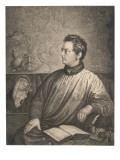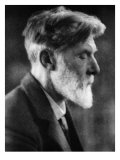|
|
|
|
|

Burning Book
Art Print
“You don’t have to burn books to destroy a culture. Just get people to stop reading them.”
Ray Bradbury
|
Ray Bradbury
b. 8-22-1920; Waukegan, IL
d. 6-5-2012; Los Angeles
Fantasy, horror, science fiction and mystery writer Ray Bradbury is best known for his dystopian novel Fahrenheit 451 (1953) and for the science fiction stories gathered together as The Martian Chronicles (1950).
|
|
• more Banned Books posters
|
|
|
|
Anne Bradstreet, née Dudley
b. c. 1612; Northampton, England
d. 9-16-1672; North Andover, Massachusetts
Anne Bradstreet, both the daughter and wife of governors of the Massachusetts Bay Colony, was the first female poet to be published from either Puritan America or England. Bradstreet was an educated woman and had an extensive personal library. Her first work “The Tenth Muse Lately Sprung Up in America, by a Gentlewoman of those Parts”, was published in London in 1647, when it was taken to England by her brother-in-law without her knowledge. It was her only book published in her lifetime.
FYI - among Bradstreet's descendents were Oliver Wendell Holmes, Sr. and Jr.
Anne Bradstreet quotes ~
• “If we had no winter, the spring would not be so pleasant: if we did not sometimes taste of adversity, prosperity would not be so welcome.”
• “If ever two were one, then surely we. If ever man were loved by wife, then thee.”
• “Thou ill-form'd offspring of my feeble brain . . .”
• “Youth is the time of getting, middle age of improving, and old age of spending.”
• “I am obnoxious to each carping tongue/ Who says my hand a needle better fits,/ A poet's pen all scorn I should thus wrong/ For such despite they cast on female wits. . . .”
|
|
|
|
|
|
|
Bertolt Brecht
b. 2-10-1898; Augsburg, Germany
d. 8-14-1956; Mitte, East Berlin
Brecht, poet, playwright, and theatre director, was a Marxist committed to the theatre as a stage for political and social ideals. His work “The Threepenny Opera” is a socialist view of the capitalist world, written with composer Kurt Weill, and based on the 1728 John Gay work, “The Beggar's Opera”.
One of Brecht's most performed plays is about the 16th century physicist Galileo and explores the themes of dogmatism, scientific evidence, and “constancy in the face of oppression.”
Bertolt Brecht quotes ~
• “Because things are the way they are, things will not stay the way they are.”
• “Do not fear death so much but rather the inadequate life.”
• “Intelligence is not to make no mistakes, but quickly to see how to make them good.”
• “The world of knowledge takes a crazy turn when teachers themselves are taught to learn.”
• “What they could do with 'round here is a good war. What else can you expect with peace running wild all over the place? You know what the trouble with peace is? No organization.”
• Bertolt Brecht: His Life, His Art and His Times, by Bertolt Brecht
|
|
|
|
Fredrika Bremer
b. 8-17-1801; Turku, Finland
d. 12-31-1865; Arsta, outside of Stockholm, Sweden
Fredrika Bremer, writer, feminist and socialist interested in international peace, was uncomfortable in the aristocratic role she was born to and wrote novels about the lack of freedom for women in Sweden. She also wrote about her travels to the U.S. and Cuba, being deeply distrubed by slavery. Bremer's work, which was written in Swedish, was translated by Mary Howitt.
An indication of her popularity is that Louisa May Alcott describes Mrs. March reading Bremer's work, as well as that of Sir Walter Scott and Maria Edgeworth, to her daughters in Little Women.
Fredrika Bremer quotes ~
• “If these slaves had only any future, anything to hope for, to strive for, to live for, any prospect before them, then I should not deplore their lot but nothing, nothing.” Homes of the New World
• “There are words which sever hearts more than sharp swords; there are words the point of which sting the heart through the course of a whole life.”
• “People have generally three epochs in their confidence in man. In the first they believe him to be everything that is good, and they are lavish with their friendship and confidence. In the next, they have had experience, which has smitten down their confidence, and they then have to be careful not to mistrust every one, and to put the worst construction upon everything. Later in life, they learn that the greater number of men have much more good in them than bad, and that even when there is cause to blame, there is more reason to pity than condemn; and then a spirit of confidence again awakens within them.”
|
|
|
|
Clemens Brentano
b. 9-9-1778; Koblenz, Germany
d. 7-28-1842; Aschaffenburg, Germany
Clemens Brentano was a poet and novelist of the Romantic Era, whose “... works are marked excess of fantastic imagery and by abrupt, bizarre modes of expression”. His younger sister was author Bettina von Arnim.
Brentano also collaborated with his friend and brother-in-law Achim von Arnim in a collection of folk-songs that were inspiration to Gustav Mahler's song cycle. He was also acquainted with Herder, Goethe, Fichte, Tiech, Wieland and Friedrich Schelegel.
The novel Doctor Faustus by Thomas Mann has a cycle of thirteen songs based on the work of Brentano.
Brentano was deeply involved in the Catholic faith and spend 1819-1824 living in seclusion and acting as secretary to Anne Catherine Emmerich who was beatified in 2004.
Clemens Brentano quotes ~
• “I was a golden harp, drawn with animal strings; all types of weather put me out of tune, and the wind played me, and the sun stretched me. And love played forte so passionately that the strings ripped, ripped in such a stupid way that I can scarcely string a spinning wheel with what remains....Now I have purged the harp in fire and strung it with metal and play it myself...” translation by John Fetzer -- from an unsent letter to Fouque, 1811 (found on a blog)
|
|
|
|
André Breton
b. 2-19-1896; Tinchebray, Orne, France
d. 9-28-1966; Paris
Writer and poet André Breton, who studied medicine and psychiatry, came to be best known as the principal founder of Surrealism. His writings include the Surrealist Manifesto of 1924, in which he defined surrealism as “Psychic automatism in its pure state, by which one proposes to express – verbally, by means of the written word, or in any other manner – the actual functioning of thought. Dictated by the thought, in the absence of any control exercised by reason, exempt from any aesthetic or moral concern.”
Poet and literary critic Guillaume Apollinaire was a collegue of Breton in the Surrealist movement.
André Breton quotes ~
• “Of all those arts in which the wise excel, Nature's chief masterpiece is writing well.”
• “I have always been amazed at the way an ordinary observer lends so much more credence and attaches so much more importance to waking events than to those occurring in dreams... Man... is above all the plaything of his memory.”
• “Everything tends to make us believe that there exists a certain point of the mind at which life and death, the real and the imagined, past and future, the communicable and the incommunicable, high and low, cease to be perceived as contradictions.”
• “All my life, my heart has yearned for a thing I cannot name.”
• “Nothing retains less of desire in art, in science, than this will to industry, booty, possession.”
• “There is nothing with which it is so dangerous to take liberties as liberty itself.”
• “No one who has lived even for a fleeting moment for something other than life in its conventional sense and has experienced the exaltation that this feeling produces can then renounce his new freedom so easily.”
• “It is living and ceasing to live that are imaginary solutions. Existence is elsewhere.”
|
|
|
|
Robert Bridges
b. 10-23-1844; Walmer, Kent, England
d. 4-21-1930; Boar's Hill, Berkshire, UK
Robert Bridges was a physician whose ill health forced retirement and the opportunity to engage fully engage as a poet.
As the Poet Laureate of England from 1913-1930 Bridges was an “enthusiastic ... needing no encouragement to shout for war (WWI)”. After the Treaty of Versailles he became a “vocal advocate of the League of Nations.”
FYI ~
• Gustav Holst was one of many composers who set a Bridges' poem to music.
• Bridges was instrumental in bringing the work of Gerard Manley Hopkins to popular attention.
• As a guest lecturer at the University of Michigan in 1924 he gave one talk to the medical school about his own experience as a doctor.
Robert Bridges quotes ~
• “I live on hope and that I think do all Who come into this world.”
• “Poetry's magic lies in the imagery which satifies even without interpretation...it is accepted as easily as it was created. ”
• The Testament of Beauty
|
|
|
|
|
|
previous page | top | next
authors list | a |
Ba-Bal | Bar | Bas-Bau | Bea-Bel | Ben-Bes | Bi | Bl | Bo | BRA-BRI | Bro | Bru-Bry | Buc-Bun | Bur-By
| c | d | e | f | g | h | i | j | k | l | m | n | o | p | q | r | s | t | u | v | w | x-y-z
|
|
I have searched the web for visual, text, and manipulative curriculum support materials - teaching posters, art prints, maps, charts, calendars, books and educational toys featuring famous people, places and events - to help teachers optimize their valuable time and budget.
Browsing the subject areas at NetPosterWorks.com is a learning experience where educators can plan context rich environments while comparing prices, special discounts, framing options and shipping from educational resources.
Thank you for starting your search for inspirational, motivational, and educational posters and learning materials at NetPosterWorks.com. If you need help please contact us.
|
|
|
|

















